The Black English Angora Rabbit is a captivating breed known for its luxurious wool and friendly disposition. In this blog, we will talk about the various aspects of owning and caring for these charming creatures, from understanding their history and physical traits to the intricacies of their care, maintenance, and breeding.
Whether you’re a prospective owner or simply an enthusiast, in this blog post guide, we will provide you valuable insights into the world of Black English Angora Rabbits.
Key Takeaways
- The Black English Angora Rabbit is a pedigreed breed with a rich history and distinct physical characteristics, including a wooly coat that requires regular grooming.
- Proper care for these rabbits includes a balanced diet, meticulous grooming to prevent matting, and attention to common health issues.
- Breeding Black English Angora Rabbits is a meticulous process that emphasizes the importance of pedigree, with kits requiring careful raising to maintain breed standards.
- The cost of owning a Black English Angora Rabbit can range from $50 to $700, influenced by factors such as pedigree, breeder reputation, and show quality.
- These rabbits are suitable for families and can be socialized with other pets and litterbox trained, making them adaptable to home environments.
Understanding the Black English Angora Rabbit
Origins and History
The Black English Angora Rabbit is a distinctive breed known for its luxurious wool and docile nature. The origins of the Black English Angora Rabbit are deeply rooted in history, with the breed being a variation of the Angora rabbit, which is one of the oldest types of domestic rabbit.
The Angora breed itself is believed to have originated in Ankara, Turkey, and was popular among European nobility by the 18th century.
The specific lineage of the Black English Angora Rabbit can be traced back to selective breeding practices aimed at achieving its unique black fur. This coloration is not only aesthetically pleasing but also quite rare, making the Black English Angora a sought-after variety for rabbit enthusiasts.
Breeders have played a crucial role in the development and preservation of this rabbit’s characteristics, often importing high-quality specimens from Europe and the United States to enhance their breeding programs.
Here is a brief timeline highlighting key moments in the history of the Black English Angora Rabbit:
- 18th Century: Angora rabbits gain popularity in Europe.
- Early 20th Century: Angora rabbits introduced to the United States.
- Mid-20th Century: Development of the Black English Angora Rabbit through selective breeding.
- Present Day: Black English Angora Rabbits are cherished as both pets and for their wool production.
Physical Characteristics
The Black English Angora Rabbit is renowned for its distinctive, luxurious wool, which is both a hallmark of the breed and a delight for rabbit enthusiasts.
\Their coat is dense and requires regular grooming to maintain its quality and prevent matting. The wool of an English Angora is finer and softer than that of other Angora varieties, making it highly sought after for textile production.
In terms of size, the Black English Angora is a small to medium-sized rabbit, typically weighing between 5 to 7.5 pounds. They possess a rounded body shape with a broad head and large, furry ears that contribute to their endearing appearance. The color of their wool is a deep, rich black that is consistent throughout their coat.
Physical Attributes of the Black English Angora Rabbit:
- Weight: 5 – 7.5 lbs
- Body Shape: Rounded
- Coat: Dense, Fine Wool
- Color: Deep Black
Temperament and Behavior
The Black English Angora Rabbit is known for its intelligent and affectionate nature, often forming strong bonds with their human companions. These rabbits are social animals, displaying a curious and engaging personality. They are typically eager to interact and can be quite playful, making them delightful pets for those who invest time in bonding with them.
Owners should be aware that while these rabbits crave attention, they also have their own unique quirks. For instance, some may have a strong preference for routine and can become stressed with sudden changes in their environment. It’s important to approach them with patience and consistency to foster a trusting relationship.
Here are a few behavioral traits commonly observed in Black English Angora Rabbits:
- Adventurous and curious
- Seeks attention and enjoys human interaction
- May exhibit a calm and laid-back demeanor
- Can be sensitive to changes in their surroundings
Understanding these traits is crucial for any prospective owner to ensure a harmonious living situation for both the rabbit and the family.
Care and Maintenance of Black English Angora Rabbits
Dietary Needs
The dietary needs of Black English Angora Rabbits are crucial for their health and well-being. A balanced diet is essential, with a focus on providing the right amount of protein. According to experts, the ideal protein content in their diet should be around 17% to 18%.
However, most commercial rabbit pellets fall short, offering only 14% to 15% protein, which necessitates careful selection of food products.
In addition to pellets, a diet rich in hay is vital for digestive health and dental care. Fresh vegetables can be offered in moderation to provide necessary vitamins and minerals. It’s important to avoid overfeeding, as obesity can be a significant health issue for these rabbits.
Below is a basic dietary guideline for Black English Angora Rabbits:
- Pellets: High in fiber, fortified with vitamins
- Hay: Timothy or other grass hays, unlimited supply
- Vegetables: Dark leafy greens and other safe vegetables
- Water: Fresh and available at all times
Always consult with a veterinarian to tailor the diet to your rabbit’s specific needs, especially if they have any health concerns.
Grooming Requirements
The secret to perfect grooming for a Black English Angora Rabbit lies in the consistency and tools used. A high-quality brush tailored for the dense and delicate fur of an Angora is essential. Brush your bunny at least a few times a week to prevent mats and tangles.
During shedding seasons, daily brushing may become necessary to manage their thick undercoat.
Grooming not only keeps the rabbit’s coat in good condition but also allows for bonding time between you and your pet. It’s important to start grooming routines early in life to acclimate your rabbit to the process. Here’s a simple grooming routine to follow:
- Begin with a wide-toothed comb to gently detangle the fur.
- Follow up with a slicker brush to remove loose fibers.
- Finish with a soft bristle brush for a smooth coat.
Remember, regular grooming is the key to maintaining your rabbit’s luxurious coat and overall well-being. Neglecting this duty can lead to serious health issues, such as wool block, where ingested fur accumulates in the digestive tract.
Health Considerations
When it comes to the health of Black English Angora Rabbits, proper care and nutrition are paramount for ensuring a long and healthy life.
These rabbits are generally robust, but like all breeds, they have specific health considerations that owners must be aware of. Regular veterinary check-ups are essential to monitor their well-being and to vaccinate against common diseases.
One common issue is the risk of overgrown nails, which can cause discomfort and may lead to more serious health problems if not regularly trimmed. It’s important to establish a routine for nail care to prevent any complications.
Additionally, due to their dense fur, these rabbits are prone to wool block, a condition where ingested hair accumulates in the digestive tract. A diet high in fiber can help prevent this condition.
Owners should also be vigilant for signs of dental problems, respiratory infections, and skin issues, which can occur in this breed. Early detection and treatment are crucial for maintaining the health of your Black English Angora Rabbit.
Breeding and Pedigree
Importance of Pedigree
The pedigree of a Black English Angora Rabbit is not just a document; it’s a blueprint of the rabbit’s genetic lineage. A well-documented pedigree is essential for breeders to maintain the purity and health of the breed. It provides a record of ancestry, allowing breeders to avoid inbreeding and to preserve desirable traits.
When considering the purchase of a Black English Angora Rabbit, the pedigree can offer insights into the rabbit’s potential for show quality, fiber production, and overall health. Angora rabbit genetics play a crucial role in the breeding process, and a pedigree is a key tool in managing genetic diversity and health outcomes. Here are some reasons why pedigree is important:
- Ensures genetic diversity
- Helps track hereditary health conditions
- Aids in maintaining breed standards
- Supports the breeding of show-quality rabbits
When breeding Angora rabbits, we prioritize the health and genetic diversity of the breed. This commitment is reflected in the pedigrees of our rabbits, which are carefully maintained to ensure the long-term well-being of the Black English Angora Rabbit population.
Breeding Practices
Responsible breeding of Black English Angora Rabbits is essential for maintaining the breed’s high standards of fiber quality and temperament. We pair for high-quality fiber and temperament in our breeding program, ensuring that each pairing is thoughtfully considered for genetic diversity and the health of the offspring.
Pedigreed rabbits are a cornerstone of responsible breeding, as they come with a lineage that can be traced and genetic traits that are predictable.
When selecting breeding pairs, factors such as coat color, texture, and density are taken into account. This meticulous selection process helps to produce kits that not only meet but exceed the breed standards. All our kits are pedigreed, and genetic color is predicted, which is crucial for breeders aiming to achieve specific colorations in their litters.
Here are some key considerations for ethical breeding practices:
- Ensuring the health and well-being of the breeding rabbits
- Providing a clean and safe environment for the does to raise their kits
- Socializing kits from an early age to promote good temperament
- Keeping detailed records of each rabbit’s pedigree and health history
- Adhering to the American Rabbit Breeders Association (ARBA) standards
Raising Kits
Raising kits, or baby rabbits, is a rewarding aspect of owning Black English Angora Rabbits. Proper care from birth is crucial for their development and overall health.
Newborn kits require a warm and safe environment, as they are born blind and entirely dependent on their mother. It’s essential to monitor the nest to ensure that all kits are being fed and are free from harm.
When the kits begin to grow, their diet transitions from mother’s milk to solid food. This is a gradual process and should be done with care to avoid digestive issues. Here’s a simple guide to follow:
- Week 1-3: Mother’s milk
- Week 4: Introduction of hay and pellets
- Week 5-7: Gradual increase in solid food intake
- Week 8: Weaning off mother’s milk
English Angoras have a denser texture and mats form easily. You should plan on devoting about 20-30 minutes a week per rabbit for grooming. If you aren’t prepared for this commitment, consider another breed. Socialization is also key; handling the kits regularly will help them become well-adjusted adults.
Remember, the time and effort you invest in the early stages will greatly influence their temperament and health as they grow.
The Cost of Owning a Black English Angora Rabbit
Initial Purchase Price
The initial purchase price of a Black English Angora Rabbit can vary significantly based on factors such as pedigree, breeder reputation, and geographical location. Prices typically range from $50 to $700, with some breeders requiring a deposit, often half of the full price, to reserve a bunny.
For example, Full Face English Angoras are often priced at $700, with a $350 deposit.
It’s important to note that while you may find lower prices, especially from non-specialized sellers, the cost can be indicative of the rabbit’s quality and lineage. Pedigree rabbits, particularly those with a documented lineage, can command higher prices due to their potential for show quality traits and breeding.
Here is a brief overview of the price ranges you might encounter:
- Non-pedigree rabbits: $50 – $150
- Pedigree rabbits from reputable breeders: $200 – $700
Remember, the initial cost is just the beginning. Prospective owners should also consider the ongoing expenses associated with rabbit care.
Ongoing Expenses
The initial purchase of a Black English Angora Rabbit is just the beginning. Ongoing expenses are a significant part of the cost of ownership. These expenses include food, grooming supplies, veterinary care, and housing.
A proper diet for an Angora rabbit consists of high-quality pellets, fresh vegetables, and unlimited hay, which can add up over time.
Grooming supplies are essential for maintaining the rabbit’s long, luxurious coat. Regular grooming sessions are necessary to prevent matting and to keep the rabbit comfortable.
Additionally, veterinary care for routine check-ups or unexpected health issues can be a considerable expense. It’s important to budget for these recurring costs to ensure the well-being of your pet.
Here is a simplified breakdown of potential monthly costs for a Black English Angora Rabbit:
- High-quality pellets: $10 – $20
- Fresh vegetables: $20 – $30
- Unlimited hay: $10 – $25
- Grooming supplies: $5 – $15
- Veterinary care (averaged out monthly): $15 – $50
Keep in mind that prices may vary based on location, availability of supplies, and individual rabbit needs. According to a recent update from ThePricer, the average cost of an Angora rabbit would be anywhere between $75 and $240, which gives a rough idea of the initial investment before considering the ongoing expenses.
Factors Influencing Cost
The cost of owning a Black English Angora Rabbit is not static and can be influenced by a variety of factors. Geographical location plays a significant role, as the price for these rabbits can vary widely depending on where you live. For instance, rabbits in urban areas may be priced higher due to increased demand and higher living costs.
Another key factor is the pedigree of the rabbit. Purebred rabbits with a documented lineage often command higher prices, especially if they come from a line of show-winning ancestors. Additionally, the age and health of the rabbit at the time of purchase can also affect the cost.
Here is a list of common factors that influence the cost of owning a Black English Angora Rabbit:
- Geographical location
- Pedigree and lineage
- Age of the rabbit
- Health and vaccination status
- Supply and demand in the area
- Breeder reputation
Understanding these factors can help potential owners budget accordingly and make informed decisions when purchasing a Black English Angora Rabbit.
Black English Angora Rabbits in the Home
 Socialization with Other Pets
Socialization with Other Pets
Introducing a Black English Angora rabbit to other household pets requires patience and careful monitoring. Socializing your rabbit early can significantly reduce their anxiety and stress levels, making interactions with other animals more pleasant for all involved. It’s important to note that while most Black English Angora rabbits can coexist peacefully with other pets, such as guinea pigs and cats, each rabbit’s personality is unique and some may require extra time to adjust.
When socializing your rabbit with other pets, always supervise their interactions closely. Start with short, controlled meetings and gradually increase the duration as your rabbit becomes more comfortable. Here’s a simple guideline to follow:
- Initial introduction: Keep your rabbit in its enclosure while allowing other pets to observe from a distance.
- Controlled interaction: Allow pets to be in closer proximity under strict supervision.
- Increased familiarity: Permit supervised free-roaming time together if all animals are calm.
Remember, the goal is to create a harmonious environment where your rabbit and other pets can thrive together. With consistent and gentle introductions, your Black English Angora rabbit can become a beloved member of the pet family.
Litterbox Training
Litterbox training a Black English Angora Rabbit is a straightforward process that can greatly simplify pet care. Begin training as soon as you bring your new rabbit home, as adult rabbits tend to learn more quickly than younger ones. Although rabbits under 4 months of age can be trained, the process may require more patience.
The key to successful litterbox training is consistency and positive reinforcement. Start by choosing a suitable litterbox that is large enough for your rabbit to move around comfortably. Fill it with a safe, absorbent material, such as recycled paper pellets or aspen shavings. Avoid using clumping cat litter or cedar chips, as these can be harmful to your rabbit’s health.
Place the litterbox in a corner of the rabbit’s enclosure where they have already shown a preference for doing their business. Encourage your rabbit to use the box by placing a handful of hay on top of the litter, as rabbits often like to eat while they eliminate.
Reward your rabbit with a small treat or gentle petting whenever they use the litterbox correctly. If accidents occur, clean them up promptly and place any droppings into the litterbox to reinforce the desired behavior.
Remember, patience and positive reinforcement are the keys to successfully litterbox training your Black English Angora Rabbit. With time and consistency, your rabbit will learn to use the litterbox, making for a cleaner and happier household.
Suitability for Families
Black English Angora Rabbits are a delightful addition to any family, especially those with children. Their calm demeanor and playful nature make them excellent pets for households seeking a gentle companion.
These fluffy creatures are known for their curiosity, which can provide endless entertainment and opportunities for children to learn about caring for animals.
When considering a Black English Angora Rabbit for your family, it’s important to assess the environment and ensure it’s safe and welcoming for a new furry member. Families should be prepared to involve children in the rabbit’s care, teaching them responsibility and empathy.
A structured approach to pet care can help children develop a strong bond with their rabbit, while also ensuring the pet’s well-being.
Here are some key points to consider when determining if a Black English Angora Rabbit is the right fit for your family:
- The rabbit’s living space must be safe and free from hazards.
- Children should be taught how to handle the rabbit gently and respectfully.
- Regular grooming sessions can become a family activity, fostering a nurturing environment.
- Rabbits require daily interaction and socialization to thrive.
Ultimately, a Black English Angora Rabbit can be a wonderful pet for families who are willing to invest time and care into their well-being. With the right preparation and commitment, these rabbits can bring joy and companionship to your home.
Conclusion:
The Black English Angora Rabbit is a unique and charming breed that has captured the hearts of many pet owners and breeders alike. With their luxurious wool and friendly disposition, they make for both lovely companions and valuable contributors to the world of fiber arts.
As we’ve seen, the market for these rabbits is diverse, with prices ranging from affordable to premium, depending on pedigree, quality, and the breeder’s reputation. Whether you’re looking to adopt a cuddly new member into your family or seeking a show-quality rabbit with champion lineage, the Black English Angora offers something for everyone.
It’s important to remember that these rabbits require dedicated care, including regular grooming and a suitable living environment, to ensure their well-being. For those willing to invest the time and love, a Black English Angora Rabbit can be a delightful and rewarding addition to your life.
FAQ;
What is the average cost of a Black English Angora Rabbit?
The average cost of a Black English Angora Rabbit can range from $50 to $700, depending on pedigree, quality, and breeder.
Can Black English Angora Rabbits be litterbox trained?
Yes, Black English Angora Rabbits can be litterbox trained, and many are socialized and trained by breeders before being sold.
Are Black English Angora Rabbits good with children and other pets?
Black English Angora Rabbits are typically well socialized and can be good with children and other pets if introduced properly.
What are the grooming requirements for a Black English Angora Rabbit?
Black English Angora Rabbits require regular grooming, including brushing to prevent matting of their long fur, and occasional trimming.
How can I ensure the pedigree of a Black English Angora Rabbit?
To ensure the pedigree of a Black English Angora Rabbit, buy from a reputable breeder who can provide pedigree papers and information about the rabbit’s lineage.
How many kits can a Black English Angora Rabbit have?
The number of kits can vary, but Black English Angora Rabbits can have large litters, with one example being a litter of 9 healthy kits.

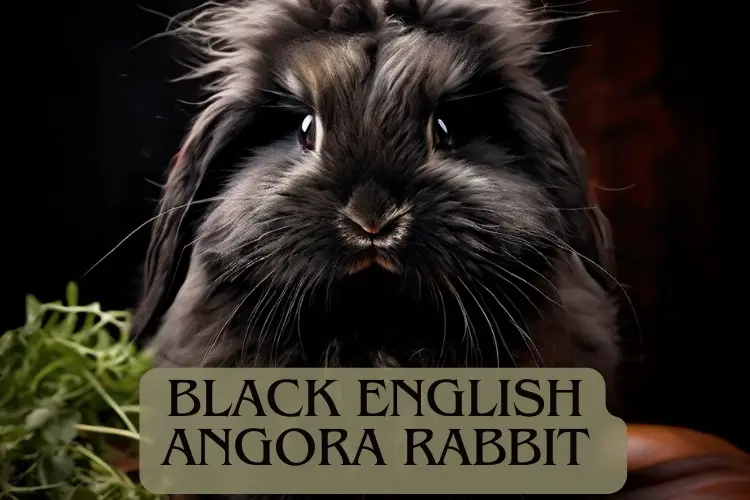
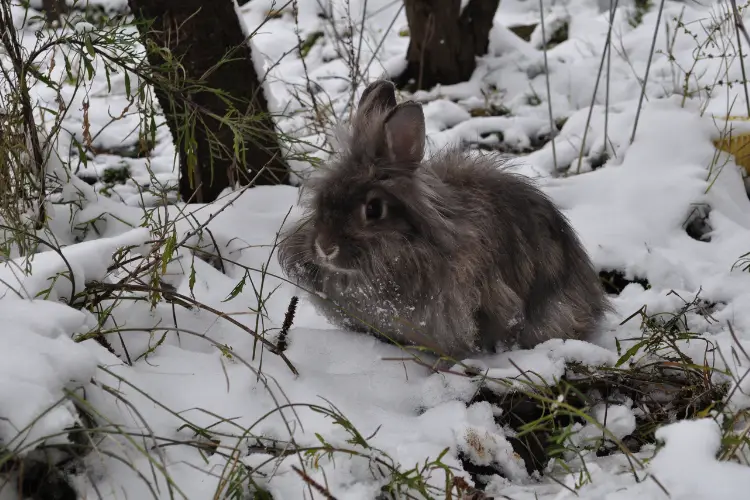
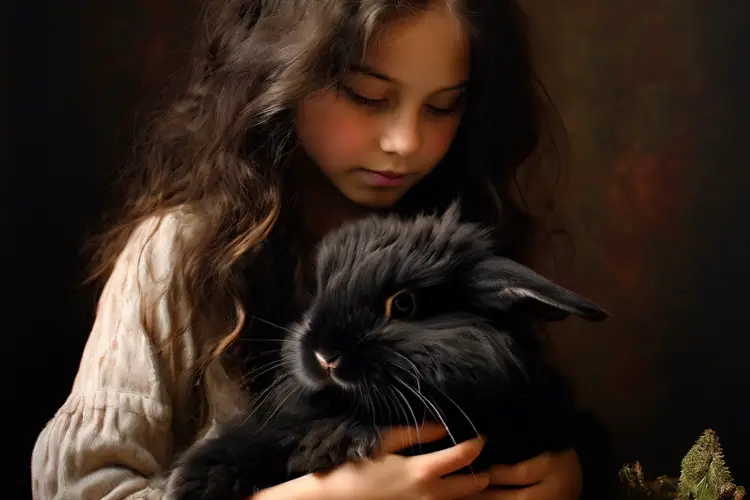
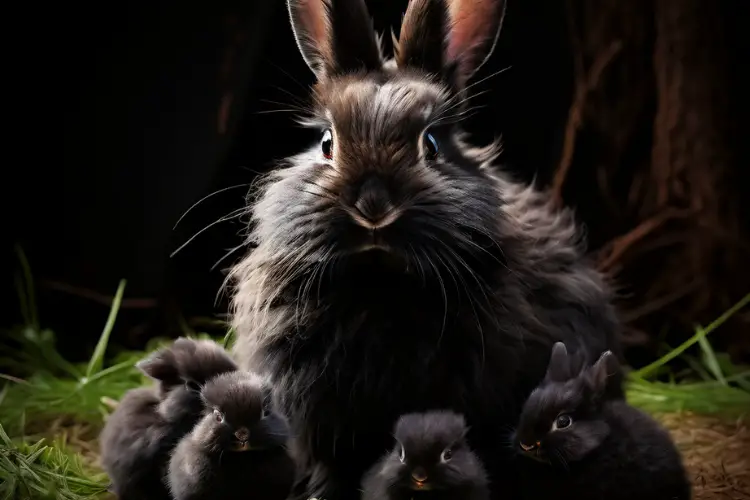
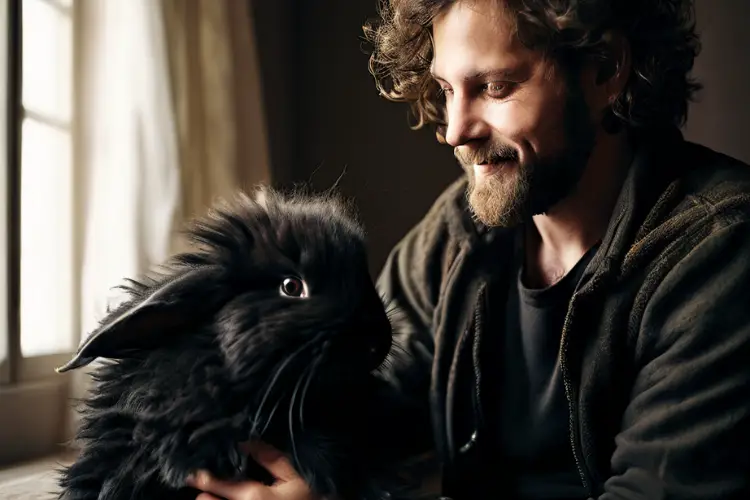 Socialization with Other Pets
Socialization with Other Pets